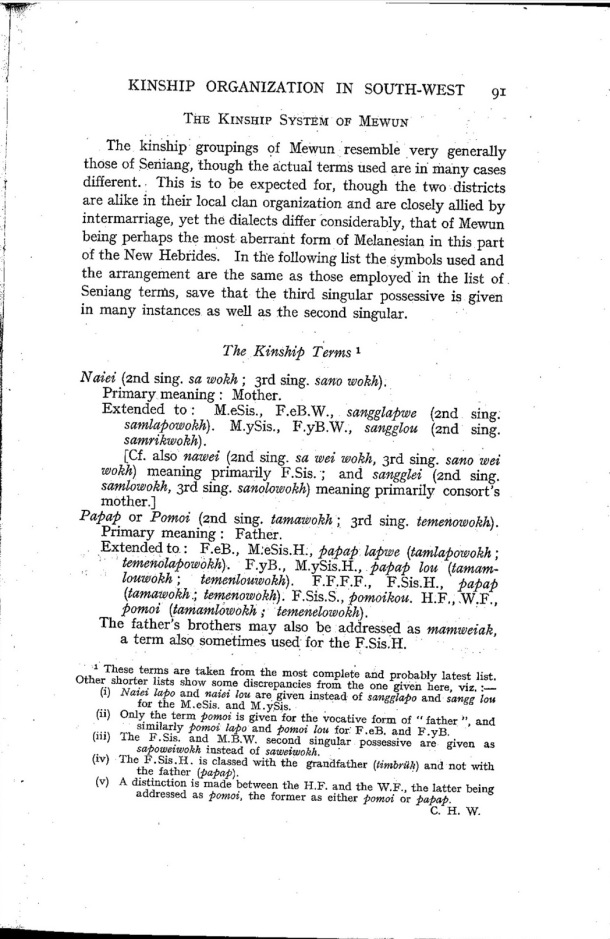|
|  [Note: this transcription was produced by an automatic OCR engine]
e
Z
1
_
KINSHIP ORGANIZATION IN SOUTH-WEST 91
THE Kmsurr Svs-rim or MEWUN
' The kinship groupings of Mewun resemble _very generally
those of Seniang, though the actual terms used are in many cases
different: This is to be expected for, though the two districts
are alike in their local clan organization and are closely allied by
intermarriage, yet the dialects differ considerably, that of Mewun
being perhaps the most aberrant form of Melanesian in this part
of the New Hebrides. In the following list the symbols used and
the arrangement are the same as those employed in the list of
Seniang terms, save that the third singular possessive is given
in many instances as well as the second singular.
The Kinship Terms 1
Naiei (2nd sing. sa 11/okh ; 3rd sing. sano wokh).
Primary meaning: Mother.
Extended to: M.eSis., F.eB.W., sangglapwe (and sing.
samlapowakh). M.ySis., F,yB.W., sangglou (2nd sing.
samrikwokh) . ,
[Cf. also nawei (2nd sing. sa wei wokh, 3rd sing. sano wei
wokh) meaning primarily F.Sis.'; and sangglei (2nd sing.
samlowokh, 3rd sing. sanolowokh) meaning primarily consoxfs
mother.]
Papap or Pomoi (2nd sing. tamawakh ; 3rd sing. temenowokh).
Primary meaning: Father.
Extended to.: F.eB., M:eSis.H., papa; lapwe (tamlajaowokh ;
' Jememlapowbkh). F.yB., M.ySis.H., papap lou (tamam~
lzmwokh; temenluuwokh). F.Sis.H., jaajrap
(tamawakh; tempnowokli). F.Sis.S., pomoikou. H.F.,.W.F.,
pomoi (tamamlowokh ,- temenelawokh).
The father's brothers may also be addressed as mamweiak,
a term also sometimes used‘ for the F.Sis.H.
‘ These terms are taken from the most complete and probably latest list.
Other shorter lists show some discrepancies from the one given here, viz. :-
(i) Naiei lwo and naisi Iau are given instead of sangglapa and sangg lau
H for the M.eSia. and M.ySis.
(ii) Only the term pomai is given for the vocative form of " lather â€ù, and
similarly pamoi mg» and ï¬Åomoi lau 10r'F.eB. and F.yB.
(in) The F.S1s. and M. .W. second singular possessive are given as
_ sapawaiwokh instead of sawaiwakh. '
(iv) 'l'hefll:T,§isti‘H. is classed with the grandfather (timbrï¬Åfl) and not with
a .
_ e er (papa?)
(v) A distinction is made between the H.F. and the W.F., the latter being
addressed as pamai, the former as either pomoi or jaapap.
C. H. W.
'
|